Sorted out the next leg
Easy day yesterday - strolled down South of Hoan Kiem, to the Loa embassy. We only intended to see if we could get a visa on arrival, but it turned out he could do one in 2 hours, so we booked in for it. Round the corner, we talked to the girls from Lao aviation, who were able to sort us out with a ticket to Vientiane for a week's time. They seemed really gentle and friendly, so I'm very much looking forward to visiting Laos. The plan so far is to have a look round the middle of the country (Hue, Ho-an and Da Nang), before coming back to Ha Noi to fly to Vientiane.
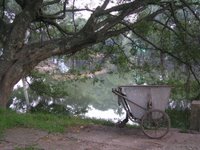
After booking the tickets, we took a walk round the south lake, while our visas were being prepared. The lake was surrounded by a large Soviet-style park, with another statue of Lenin. At first this was a bit offputting, as the communists seem to take their fun seriously, with set areas for different types of recreation. The whole thing had the feel of a seaside town out of season, with far too few people for the attractions, and faded, peeling paint.
Luckily, first impressions were wrong. As we went further in, we saw the more relaxed side of Hanoi life. A couple of people were fishing for sprats with a thread on the end of a stick, some kids were playing football, and there was an area devoted to old guys playing a board game with round tokens inscribed with chinese characters. Further round, there were more people doing tai-chi style exercises, and physical stretches. Overall, though, the mood was one of relaxed contemplation. Perhaps in Hanoi more than any other city, out of the main streets, the locals can just sit and be.
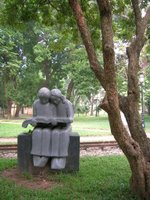
Today was a complete contrast. We took the sleeper train south to the old imperial capital of Hue. We travelled first class, taking the left hand 2 bunks of a 4-bunk compartment, which was nicely air-conditioned. It was obvious from the first that this was a state run railway, though, as they thoughtfully piped very loud music into the corridor outside our cabin, together with inspirational words in Vietnamese and English. After 2 hours this mercifully died down, and our ticket inspector came in. Up to then, we had only had our ticket checked by a guard at the entrance to the station, a guard at the entrance to the platform, and a guard on the door of the train. This new inspector took our ticket and gave us in return a small piece of laminated card, filled with words in Vietnamese, and ending with the English words "Good Luck".
We settled in to an intermittent night's sleep - the air conditioning seeming to go from far to hot to far too cold at random moments, and were woken to the sound of piped music once more. We were also treated to a short history of Hue's importance in the war against the Americans. Just before arrival the inspector came back and replaced the laminated card with our original tickets, and we disembarked.
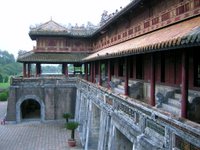
Hue is a complete contrast to Hanoi. It is actually quite a recent capital, being the seat of the Nguyen dynasty, from about 1800 to 1945, when the king abdicated in favour of the communist government. It was a major part of the founding of Vietnam, though, as the king ruled over what was essentially the country borders we know today. Some of the kings were patriots, but others seem quite indifferent to the fate of their fellow countrymen. When the French suggested to one King that they should industrialise, in order to better the lot of the poor, he replied that he did not think that was a good thing, as he prefered them poor.
Having Hue as a major sight seems a bit unusual for a communist country, as it is essentially glorifiying status differences, but Vietnam has suffered a lot at the hands of so many different invaders that it presumably needs to keep hold of whatever history it has.
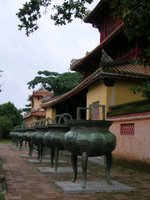
As a town, Hue is a tribute to capitalism, and particularly the great god, tourism. We chose to walk from the railway station, and everywhere we went with backpacks we were surrounded by touts looking to introduce us to our hotel. It got so bad at one point that I pretended I could only speak welsh, and mouthed gibberish at a couple till they went away. I think the only intelligible word I spoke was "Cymru" - that being more or less the only welsh word I know. Perhaps I should learn some more, as it seemed to do the trick.
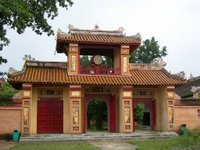
The old imperial city was modelled on the Forbiden city of Beijing, and must have looked quite grand in its day, but after suffering 50 years of neglect, bombing, shooting and even a typhoon, there is probably only 30% still standing. These were a couple of the entrance gates, the first few large halls, and a reading pavillion. The rest is being rebuilt with the help of UNESCO, and more should come on line each year.
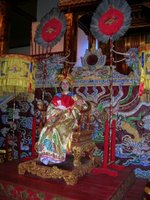
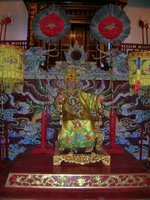 The cheesiest, but most fun, two tourist experiences I have had have definitely come in Hue, though. In one hall, a rack of clothes hung up, and we were able to pay (less than one pound) to dress up as the king and queen, and have our photo taken on the throne. At last, a country that recognises my true worth!
The cheesiest, but most fun, two tourist experiences I have had have definitely come in Hue, though. In one hall, a rack of clothes hung up, and we were able to pay (less than one pound) to dress up as the king and queen, and have our photo taken on the throne. At last, a country that recognises my true worth!
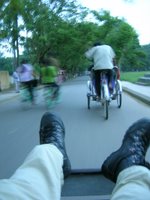 Later, Sara being quite tired, we took a cyclo to the restaurant. This was my first cyclo, and was a little like being in the basket of a large bike. The man behind pedalled at a sedate pace, and I lay back and watched the city slowly glide past. Now that's travelling!
Later, Sara being quite tired, we took a cyclo to the restaurant. This was my first cyclo, and was a little like being in the basket of a large bike. The man behind pedalled at a sedate pace, and I lay back and watched the city slowly glide past. Now that's travelling!

After booking the tickets, we took a walk round the south lake, while our visas were being prepared. The lake was surrounded by a large Soviet-style park, with another statue of Lenin. At first this was a bit offputting, as the communists seem to take their fun seriously, with set areas for different types of recreation. The whole thing had the feel of a seaside town out of season, with far too few people for the attractions, and faded, peeling paint.
Luckily, first impressions were wrong. As we went further in, we saw the more relaxed side of Hanoi life. A couple of people were fishing for sprats with a thread on the end of a stick, some kids were playing football, and there was an area devoted to old guys playing a board game with round tokens inscribed with chinese characters. Further round, there were more people doing tai-chi style exercises, and physical stretches. Overall, though, the mood was one of relaxed contemplation. Perhaps in Hanoi more than any other city, out of the main streets, the locals can just sit and be.

Today was a complete contrast. We took the sleeper train south to the old imperial capital of Hue. We travelled first class, taking the left hand 2 bunks of a 4-bunk compartment, which was nicely air-conditioned. It was obvious from the first that this was a state run railway, though, as they thoughtfully piped very loud music into the corridor outside our cabin, together with inspirational words in Vietnamese and English. After 2 hours this mercifully died down, and our ticket inspector came in. Up to then, we had only had our ticket checked by a guard at the entrance to the station, a guard at the entrance to the platform, and a guard on the door of the train. This new inspector took our ticket and gave us in return a small piece of laminated card, filled with words in Vietnamese, and ending with the English words "Good Luck".
We settled in to an intermittent night's sleep - the air conditioning seeming to go from far to hot to far too cold at random moments, and were woken to the sound of piped music once more. We were also treated to a short history of Hue's importance in the war against the Americans. Just before arrival the inspector came back and replaced the laminated card with our original tickets, and we disembarked.

Hue is a complete contrast to Hanoi. It is actually quite a recent capital, being the seat of the Nguyen dynasty, from about 1800 to 1945, when the king abdicated in favour of the communist government. It was a major part of the founding of Vietnam, though, as the king ruled over what was essentially the country borders we know today. Some of the kings were patriots, but others seem quite indifferent to the fate of their fellow countrymen. When the French suggested to one King that they should industrialise, in order to better the lot of the poor, he replied that he did not think that was a good thing, as he prefered them poor.
Having Hue as a major sight seems a bit unusual for a communist country, as it is essentially glorifiying status differences, but Vietnam has suffered a lot at the hands of so many different invaders that it presumably needs to keep hold of whatever history it has.

As a town, Hue is a tribute to capitalism, and particularly the great god, tourism. We chose to walk from the railway station, and everywhere we went with backpacks we were surrounded by touts looking to introduce us to our hotel. It got so bad at one point that I pretended I could only speak welsh, and mouthed gibberish at a couple till they went away. I think the only intelligible word I spoke was "Cymru" - that being more or less the only welsh word I know. Perhaps I should learn some more, as it seemed to do the trick.

The old imperial city was modelled on the Forbiden city of Beijing, and must have looked quite grand in its day, but after suffering 50 years of neglect, bombing, shooting and even a typhoon, there is probably only 30% still standing. These were a couple of the entrance gates, the first few large halls, and a reading pavillion. The rest is being rebuilt with the help of UNESCO, and more should come on line each year.

 The cheesiest, but most fun, two tourist experiences I have had have definitely come in Hue, though. In one hall, a rack of clothes hung up, and we were able to pay (less than one pound) to dress up as the king and queen, and have our photo taken on the throne. At last, a country that recognises my true worth!
The cheesiest, but most fun, two tourist experiences I have had have definitely come in Hue, though. In one hall, a rack of clothes hung up, and we were able to pay (less than one pound) to dress up as the king and queen, and have our photo taken on the throne. At last, a country that recognises my true worth! Later, Sara being quite tired, we took a cyclo to the restaurant. This was my first cyclo, and was a little like being in the basket of a large bike. The man behind pedalled at a sedate pace, and I lay back and watched the city slowly glide past. Now that's travelling!
Later, Sara being quite tired, we took a cyclo to the restaurant. This was my first cyclo, and was a little like being in the basket of a large bike. The man behind pedalled at a sedate pace, and I lay back and watched the city slowly glide past. Now that's travelling!
0 Comments:
Post a Comment
<< Home